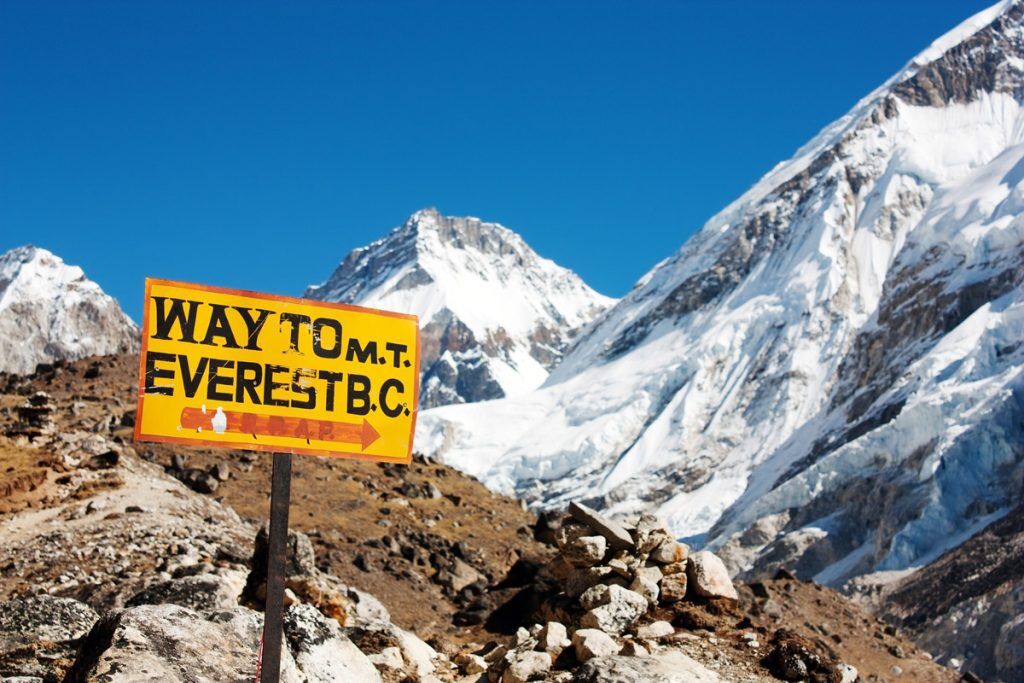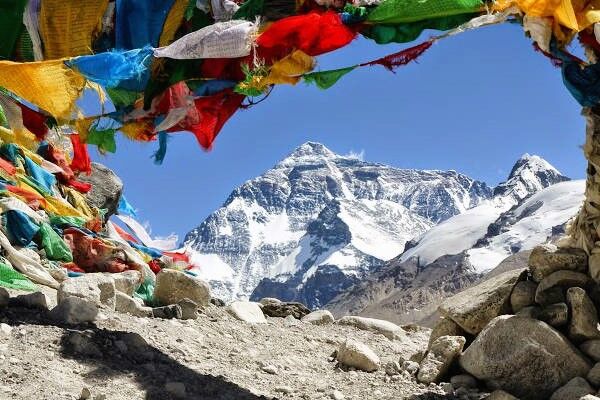Everest is the gateway to heaven and the dream of many adventurous souls. Though the Everest Base Camp Trek is considered a moderate trek, it’s essential to be aware of the challenges before you set off.
“Is the Everest Base Camp trek difficult?”
“How difficult is the Everest Base Camp trek”?
Or “Can a beginner do the Everest Base Camp trek?”
These are a few of the common questions we get asked. The biggest challenges are the altitude and the physical fitness of the trekkers. Unpredictable weather, like cold temperatures, high winds, and possible snowfall, can make the trek even more challenging. Therefore, let’s dive into this blog, where you’ll find answers with expert insights for Everest Base Camp Trek and how to prepare for it.

What is the Hardest Part of Everest Base Camp?
Everest Base Camp (EBC) is challenging, but the “hardest part” can vary depending on the individual. This is the biggest hurdle for most trekkers. As you gain altitude, the air gets thinner, making even simple tasks more difficult. You might experience headaches, shortness of breath, fatigue, and trouble sleeping. Proper acclimatization is crucial to mitigating these issues.
How Difficult is the Everest Base Camp Trek?
The Everest Base Camp trek is moderately complex. Even though it’s not a technical climb, the high altitude (5,364 m) is the biggest challenge. Expect daily hikes for hours; uneven trails and steeper sections make trekkers feel executed. You can avoid altitude sickness and be immune to the pain with training and proper acclimatization. It’s a rewarding adventure for many.
Recommended Read: How Hard is Everest Base Camp Trek
Can a Beginner Trek Everest Base Camp?
Yes, a beginner can potentially trek to Everest Base Camp. Prior training builds stamina, which helps your body adjust to the thin air, reducing the risk of altitude sickness. This isn’t an easy trek. You should be comfortable walking for several hours with some inclines. As a beginner, hiring a guide is highly recommended. A guide offers expert navigation and can monitor your health.

How Long Does the Trek to Everest Base Camp Take?
The trek to Everest Base Camp (EBC) typically takes between 15 and 20 days, depending on the chosen itinerary, route, package, and trekking speed. The trekking routes to Everest are crafted based on your trekking preferences, expatriates, and physical fitness.
Standard Duration
The classical route to Everest Base Camp Trek falls within this 14-15-day range. This allows for acclimatization days, which are crucial for adjusting your body to the high altitude (EBC sits at 5,364 meters) and reducing the risk of altitude sickness.
Shorter Options
Holidays packages like a short trek to Everest Base Camp option for those trekkers with limited time. It takes 10-12 days, which offers the top service and comfortable trekking throughout the hike.
Longer Options
Some trekkers might opt for longer itineraries (up to 16 days or more), incorporating additional side trips or slower acclimatization schedules. Luxury trek Everest Base Camp can be a good option for those who want a more relaxed pace or to explore more of the Khumbu Valley.
Recommended Read: How Long is EBC Trek
Tips for Overcoming Difficulty in EBC Trek
- Preconditioning is vital. Regular cardio, like running or hiking, builds lung capacity and stamina for the low-oxygen environment.
- Don’t rush! Choose an itinerary with built-in acclimatization days to allow your body to adjust safely to the increasing altitude.
- Drink consistently throughout the day, even if you don’t feel thirsty. Dehydration worsens altitude sickness.
- Headaches, nausea, and fatigue could be signs of altitude sickness. Descend if needed and consult your guide immediately.
- A can-do spirit makes a difference. Focus on the incredible experience and the breathtaking views that await you.
- Pace yourself, especially uphill. Take frequent breaks to rest, admire the scenery, and recharge for the next leg.
Packing Essentials

Clothing (for layering):
- Base Layer: Moisture-wicking thermals (tops and bottoms) for warmth and sweat management.
- Insulation Layer: Fleece or wool jacket/sweater for warmth during colder temperatures.
- Outer Layer: Waterproof and breathable hiking jacket and trousers to shield you from wind, rain, and snow.
- Hiking Shirt: Quick-drying, comfortable shirt for sun protection and breathability.
- Hiking Socks: Breathable and moisture-wicking socks to prevent blisters. Consider liner socks for added comfort.
- Underwear: Quick-drying and comfortable underwear.
- Hat: Wide-brimmed hat for sun protection and a warm beanie for cold weather.
- Buff/Neck Gaiter: Versatile for sun protection, warmth, and dust protection.
- Gloves: Inner gloves are used for warmth, and waterproof outer gloves are used for snow/rain.
Footwear:
- Hiking Boots: Sturdy, well-broken-in, waterproof hiking boots with good ankle support for uneven terrain.
Other Essentials:
- Daypack: Comfortable backpack for carrying essentials during day hikes (around 30L).
- Duffel Bag: A larger duffel bag for all your gear transported by porters (if using their service).
- Sleeping Bag: Rated for cold temperatures (around -15°C/-5°F), as nights can be chilly at higher altitudes.
- Sleeping Bag Liner: Optional for added warmth and hygiene.
- Headlamp: Essential for nighttime use with a spare set of batteries.
- Trekking Poles: Provide stability and reduce knee pressure, especially on descents.
- Sunglasses: UV protection for sun glare on snow and high altitudes.
- Sunscreen: Broad-spectrum, high SPF sunscreen to protect exposed skin.
- Water Bottle/Hydration Bladder: Stay hydrated throughout the trek. Consider a 2-liter capacity.
Water Purification
- Tablets/Drops: To purify drinking water on the trail (consult proper usage guidelines).
- Personal Toiletries: Pack essentials like toothbrushes, toothpaste, biodegradable soap, and toilet paper.
- First-Aid Kit: A compact kit with essential supplies for treating minor injuries and ailments.
- Cash: Small denominations of Nepali rupees for teahouses and miscellaneous expenses.
- Cash/Credit Card for Extras: Some teahouses might accept electronic payments for additional charges depending on your itinerary.
- Trekking Permit & TIMS Card: Essential permits for trekking in Nepal.
- Personal Medication: Pack any prescription medications you require and over-the-counter drugs for altitude sickness (consult your doctor).
- Entertainment: Lightweight books, playing cards, or a small music player for rest days.
- Camera: Capture the breathtaking scenery! Consider a spare battery and memory card.
Recommended Read: What to Pack for EBC Trek
Hire Experts Guides from Tidy Himalaya
Safety
Tidy Himalaya has a guide with wilderness first-aid training that can be crucial in case of emergencies or altitude sickness.
Navigation
They ensure you stay on the trail, especially in areas with limited visibility or challenging terrain.
Acclimatization Expertise
Our guides help you pace yourself and make informed decisions about rest days for proper acclimatization, reducing altitude sickness risks.
Cultural Insights
They can share knowledge about the Sherpa culture, local customs, and the region's history.
Language Barrier Assistance
Our guides can bridge the communication gap if you don’t speak Nepali.
Logistical Support
They can handle permits, liaise with teahouses, and ensure a smoother overall experience.
Motivation and Support
Guides can provide encouragement, keep you motivated throughout the trek, and offer companionship.
FAQs:
Can you do Everest Base Camp without training?
Skip training for Everest Base Camp and set yourself up for altitude sickness, exhaustion, and a miserable trek. The high altitude and demanding hikes require a good physical condition to avoid altitude sickness and enjoy the trek. Prior training significantly increases your chances of success and a safe, enjoyable experience.
Is the Everest Base Camp trek worth it?
Whether the Everest Base Camp (EBC) trek is worth depends on your priorities and preferences. Witness the majestic Himalayas up close, including Everest, Lhotse, and Ama Dablam. Reaching EBC is a personal achievement that requires effort and perseverance. Immerse yourself in the unique traditions and hospitality of the Sherpa people. EBC offers a challenging yet achievable adventure compared to climbing Everest itself.
Recommended Read: Why is Everest Base Camp Trek Popular
What is the success rate of Everest Base Camp?
There aren’t official statistics on Everest Base Camp success rates, but estimates suggest it’s high, around 95-97%.
Can you solo Everest Base Camp?
Official Regulations (as of March 2024): Nepal requires a licensed guide for treks in national parks and conservation areas that require a TIMS card. This applies to the most popular trekking regions, including Everest, Annapurna, and Langtang.
Also Read: Can You Trek to EBC on Your Own
What is the age limit for the Everest Base Camp Trek?
While there’s no set minimum, most trekking companies recommend a minimum age of 10-12. This is due to the physical demands and the potential impact of high altitude on younger children.
Do you lose weight after trekking at Everest Base Camp?
Trekking Everest Base Camp (EBC) often leads to weight loss, but the amount varies depending on several factors. The trek burns many calories due to daily hikes, carrying gear, and being in a high-altitude environment. High altitude can suppress appetite, leading to less calorie intake. In some cases, muscle loss might occur alongside fat burning if your calorie intake isn’t insufficient.




